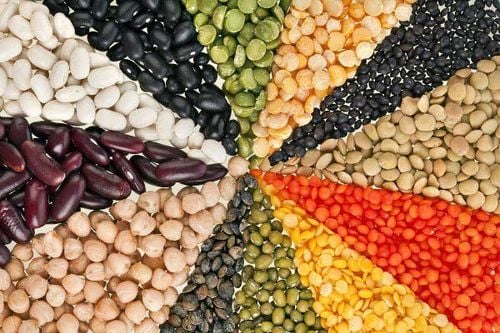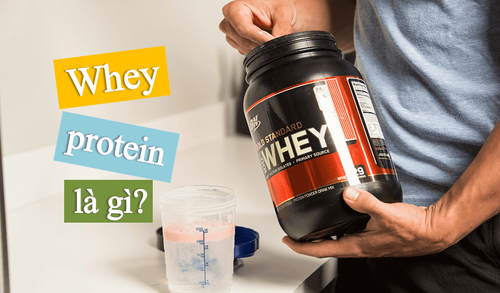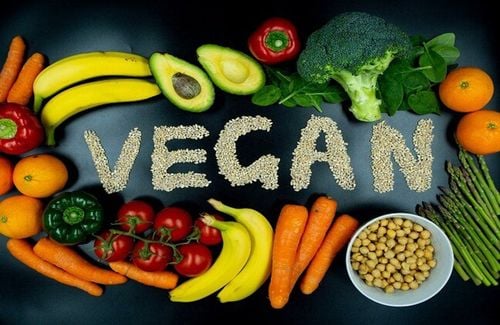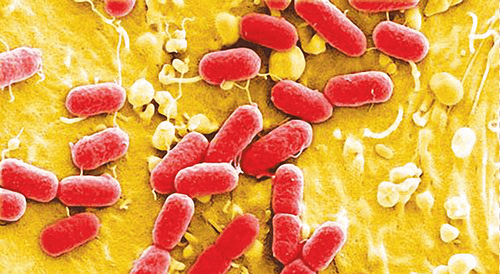This is an automatically translated article.
Bodybuilders and weightlifters need to increase the amount of protein in their diets to maintain or build large muscle mass. However, protein supplementation for bodybuilders is limited. Taking too much can do more harm than good.
1. General principles in the diet
Daily requirements for proteins, fats and carbohydrates are recommended by the nutrition authorities of each country. In the United States, the Office for Disease Prevention and Health Promotion (ODPHP) - a subsidiary of the Department of Health and Human Services - makes recommendations every five years.
As part of the guidelines, the ODPHP has recommended a protein intake of 10% to 35% of total daily calories for women and men over 18 years of age.
Although more calories are needed during exercise, the amount of protein needed by bodybuilders will still be within this range. Several recent studies published in the Journal of Nutrition have confirmed protein consumption at the top of the recommended scale for a wide range of trainers and fitness enthusiasts.
2. Calorie method
Many bodybuilders will use the grams per calorie formula to guide their protein consumption. While some trainers will calculate based on 35% of total calories, others may calculate about 30% or less.
Assume that a bodybuilder weighs 90 kg, now the calories need to be consumed will amount to 4,000 calories per day, protein will account for 1,200 of them (4,000 calories x 30% = 1,200 calories).
Since one gram of protein equals 4 calories, it means that a 90 kg bodybuilder should consume about 300 grams of protein per day (1,200 calories ÷ 4 calories/gram = 300 calories).
For reference, 300 grams of protein is equivalent to two 60-gram chicken breasts, one 85-gram steak, two 80-gram cans of tuna, half a dozen eggs (35 grams), 3 cups of milk (25 grams) and 15 grams Tofu.

Lượng calo hàng ngày của người tập thể hình cần được kiểm soát chặt chẽ
However, your body weight and training goals will change your actual protein needs.
Furthermore, most sports nutrition governing bodies will require you to consume no more than 2 times the daily recommended amount of protein compared to non-athletes. For an adult aged 31 to 50, this can range from 150 grams (for a 2,000-calorie diet) to 225 grams (for a 3,000-calorie diet) of protein per day.
With this wide range, there is an alternative calculation method that may be more suitable for you as a bodybuilder.
3. Body weight method
While the protein requirement for an adult male is 0.8 grams per kilogram of body weight per day, according to the Dietary Reference Intakes of the National Institutes of Health (DRI), a study Published studies evaluate nitrogen balance as a product of protein breakdown. It has been suggested that to calculate protein intake for muscle gain athletes may need three times that amount, or about 2.5 grams per kilogram of body weight per day (gm/kg/day). .
However, for bodybuilders, their minimum body fat percentage is between 2.3 - 3.1 g/kg body weight. For a 90 kg bodybuilder, using 2.5 grams/kg of body weight translates to 225 grams of protein per day (90 kg x 2.5 g/kg = 225 grams).
There are some who would argue that 225 grams/day is still too much for anything but intense competition training. For example, consider that an average adult male who weighs 90 kg only needs 72 grams of protein per day (90 kg x 0.8 gm/kg = 72 grams), according to the protein recommendations provided by the NIH's DRI and USDA Dietary Guidelines for Americans.
On a practical basis, it's hard to justify tripling your protein intake. This is especially true if you follow the advice that you shouldn't consume more than twice the daily allowance of protein than other adults of your age and gender.
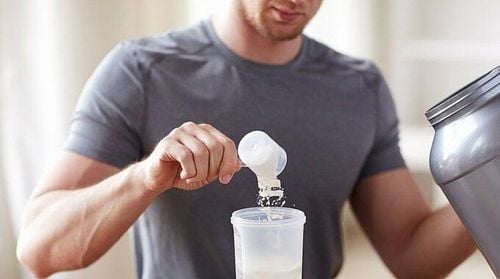
Bổ sung protein đối với người tập thể hình phù hợp theo độ tuổi và giới tính
Many sports nutritionists confirm 2.0 grams/kg/day as the upper limit of protein intake for athletes. Lower amounts will suffice for moderate or low intensity training.
For a bodybuilder weighing 90 kg, that translates to 180 grams per day (90 kg x 2.0 grams/kg = 180 grams). While this is still more than double the recommended amount for a sedentary 90 kg male, it can be appropriate when actively training for competition.
4. Risk of excess protein
Supplementing with excess protein the body needs will create an excessive burden on the bones, kidneys and liver. This is especially true for people with underlying kidney disease where proteinuria (protein in the urine) is a sign of kidney damage.
Furthermore, a high protein/high meat diet is associated with an increased risk of coronary heart disease due to saturated fat and cholesterol intake. In essence, you can be a bodybuilder and still be at risk for atherosclerosis or hardening of the arteries, heart attacks, and strokes.
Therefore, when using high protein intake, more water intake will be required to help the kidneys filter out the excess waste caused by absorbing too much protein.
Increased fluid intake is needed to help the kidneys filter out excess waste from absorbing too much protein, while vitamin B6 plays a role in protein, carbohydrate and fat metabolism.

Nên bổ sung lượng protein hợp lý cho cơ thể
5. Fast and slow protein
The rate at which proteins are converted to amino acids and absorbed into the muscles may vary depending on the type of protein. There are some bodybuilders who will tell you that a fast protein like whey protein is superior to a slow protein like casein in that you can consume more and build muscle faster. Example:
Protein in eggs is absorbed at a rate of 1.3 grams per hour. Casein is absorbed at a rate of 6.1 grams per hour. Whey is absorbed at a rate of 8 to 10 grams per hour.
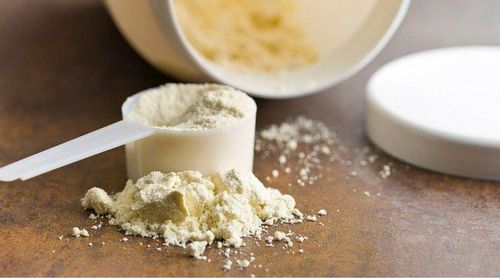
Whey được hấp thụ nhanh chóng vào cơ thể người tập thể hình
There isn't much evidence that these variations make a big difference in muscle protein utilization with long-term muscle-building effects. Furthermore, if a protein is metabolized and absorbed at a rate, such as 7 grams per hour, you will only absorb about 168 grams per day.
With these restrictions, the type of protein you consume really won't make that much of a difference to how much you can reasonably consume. Some whole-food proteins can be just as good — or even better — and cost much less.
One advantage that casein and whey products offer, in addition to convenience, is that you may not have to consume as much as some whole protein products.
Customers who have any questions about nutrition, can leave questions in the ASK DOCTOR VINMEC section on the website. Questions will be consulted by the doctor and sent to you as soon as possible.
Please dial HOTLINE for more information or register for an appointment HERE. Download MyVinmec app to make appointments faster and to manage your bookings easily.
The article is referenced at the source: ncbi.nlm.nih.gov, verywellfit.com, webmd.com



